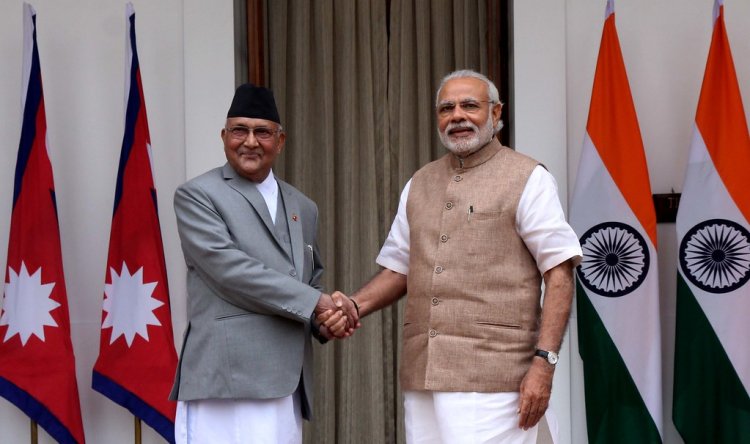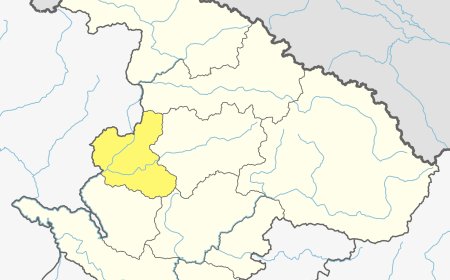Relationship between Nepal and India
Discover the unique bond between Nepal and India, their assistance to one another, and the ways both countries can work together to further strengthen their relationship.

The diplomatic relations between India and Nepal were established on June 17, 1947. The relationship between Nepal and India is involuntary and has a long history. India and Nepal have maintained amicable and cooperative relations, predicated on the principles of mutual deference, understanding, and cooperation. The two countries share a long and porous border, and there are proximate cultural, economic, and political ties between them. Historically, Nepal was a Hindu monarchy, and India accommodated it as a source of cultural, religious, and economic influence. In recent decades, the relationship between Nepal and India has been characterized by both cooperation and tension. On the other hand, India is Nepal's largest trading partner and a major investment and development source. The two countries additionally cooperate on security, trade, and energy issues.
On the other hand, there have been tensions between the two countries over issues such as the management of their shared border, trade imbalances, and Nepali perceptions of Indian interference in its domestic politics and territorial issues.
India has provided significant assistance to Nepal in various fields, including:
-
Education:
India has made a great contribution to generating human resources by providing different education facilities. India offers scholarships to Nepalese students to pursue higher education in various fields at Indian universities and institutions. Economic Development:
India has extended economic and financial assistance to Nepal, including providing grants and loans for development projects such as infrastructure development, health and education, and energy sector projects.-
Trade and Commerce:
India is one of Nepal's largest trading partners and provides market access to Nepali products. India has facilitated the development of cross-border trade and investment between the two countries. -
Humanitarian Assistance:
India has assisted in natural disasters and emergencies in Nepal. such as relief materials, medicines, and rescue teams. Security Cooperation:
India and Nepal cooperate closely on issues of security and border management, including anti-terrorism efforts and intelligence sharing.-
Cultural Exchanges:
India and Nepal have a rich cultural heritage, and India has supported cultural exchanges between the two countries to strengthen cultural ties.
India's assistance to Nepal has been focused on the education system, promoting economic development, stability, and security in the region, and enhancing the welfare of the people of Nepal.
India provides a helping hand to Nepal for several reasons, including:
-
Strategic Interests:
India sees Nepal as an important partner in South Asia and recognizes its strategic importance in maintaining regional stability and security. India recognizes the role that Nepal can play in promoting regional integration and cooperation. -
Economic Interests:
India has a strong economic interest in Nepal, as it is one of India's largest trading partners and provides market access to Indian goods and services. India also recognizes the potential for further economic cooperation and investment in areas including hydropower, tourism, trade, and so on. Cultural Ties:
India and Nepal share a strong cultural heritage, and India recognizes the importance of preserving and promoting these cultural ties for the benefit of both countries-
Humanitarian Concerns:
India has been providing humanitarian assistance to its neighbors, including during natural disasters and emergencies, and it has extended this support to Nepal. -
Regional Cooperation:
India views its relationship with Nepal as part of its broader strategy for regional cooperation and integration in South Asia, and it recognizes the role that Nepal can play in promoting regional stability and security.
India's helping hand to Nepal reflects a combination of strategic, economic, cultural, and humanitarian interests, and recognition of the importance of a strong and stable partnership between the two countries.
Nepal and India have a close relationship, and Nepal has also provided various forms of assistance to India in several areas, including:
-
Security Cooperation:
Nepal has cooperated with India in maintaining security and stability in the region, particularly in terms of managing the shared border and combating terrorism and organized crime. -
Hydroelectric Power:
To meet India's rising energy needs, Nepal and India have struck several agreements to develop hydroelectric projects. Nepal can generate a significant amount of hydroelectricity. -
Water Resource Management:
Nepal is an important source of water for India, and the two countries have been working together to manage their shared water resources effectively. -
Tourism:
The Nepali government has been making efforts to attract tourists from India and strengthen cultural and economic relations because Nepal is a popular tourist destination for Indians. -
Labor Migration:
Nepal is a source of labor migration to India, including in the construction and hospitality sectors, and has been working with India to ensure the rights and welfare of Nepali workers in India.
Nepal's assistance to India has been aimed at enhancing regional cooperation and promoting economic development, stability, and security in the region.
Nepal continues its friendship with India for several reasons:
-
Proximity and Interdependence:
Nepal and India share a long and porous border, and the two countries are closely interdependent in terms of trade, investment, and people-to-people ties. This proximity and interdependence make it important for both countries to maintain good relations. -
Cultural Ties:
Nepal and India share a rich cultural heritage, and there are close cultural, religious, and linguistic ties between the two countries. This shared heritage helps to strengthen the friendship between the two countries. Economic Benefits:
India is one of Nepal's largest trading partners, and Nepali products have access to the large Indian market. India is also a major source of investment and development assistance for Nepal, and these economic ties help to sustain the friendship between the two countries.-
Security Cooperation:
Nepal and India cooperate closely on issues of security and border management, and both countries recognize the importance of maintaining stability and security in the region. -
Regional Integration:
Nepal recognizes the importance of regional cooperation and integration in South Asia, and it sees its friendship with India as an important part of this process.
Nepal's friendship with India reflects a combination of historical, cultural, economic, and security considerations, and recognition of the importance of a strong and stable partnership between the two countries.
Nepal can take several steps to maintain and strengthen its relationship with India in the future:
-
Promoting Trade and Investment:
Nepal can work to enhance trade and investment ties with India, particularly in areas such as hydropower, tourism, and agriculture, which have the potential to create jobs and boost economic growth. -
Strengthening Cultural Ties:
Nepal can continue to promote cultural exchanges with India, including through programs like student exchanges and cultural festivals, to help preserve and strengthen the rich cultural heritage shared by the two countries. -
Improving Border Management:
Nepal and India can work together to improve border management, including through measures such as increased border infrastructure and enhanced cross-border trade and investment. -
Enhancing Regional Cooperation:
Nepal can play an active role in promoting regional cooperation and integration in South Asia, including through participation in regional organizations like the South Asian Association for Regional Cooperation (SAARC). -
Building Mutual Trust:
Nepal can work to build mutual trust with India by addressing sensitive issues constructively and transparently and working together to find mutually acceptable solutions.
By taking these steps, Nepal can maintain and invigorate its relationship with India and enhance regional stability, security, and prosperity in South Asia. The relationship between Nepal and India is of great importance for both countries and the region as a whole. It is consequential for both sides to collaborate to address their differences and reinforce their ties for the benefit of the people of both countries.
What's Your Reaction?





































































































